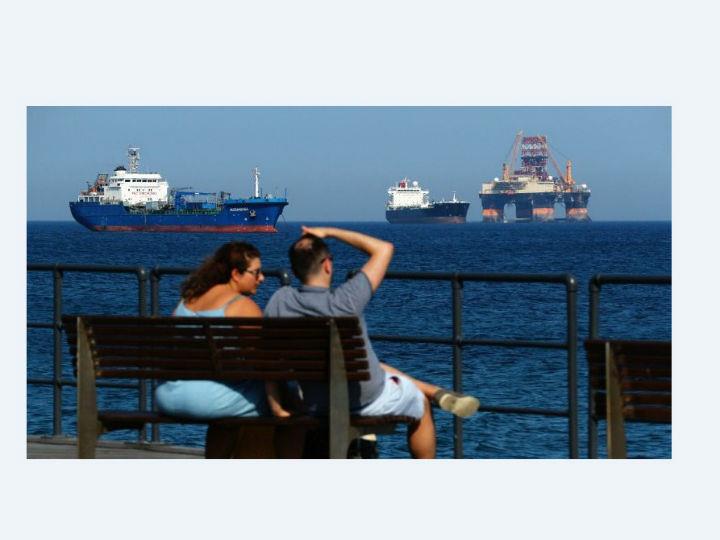by Rony Halman*
Without necessarily recognising its full weight, the EU has a fundamental interest in facilitating an agreement between Israel and Cyprus, necessary to finally enable the development of the major Aphrodite natural gas field offshore Cyprus, which also extends to the “Ishai” Lease in Israel’s Exclusive Economic Zone (EEZ).
As parties from both sides of the border admit the field indeed overflows into Israeli waters, disagreement remains only about quantities, while mainstream estimations of Israel’s portion are about 10% of the field.
Although bigger fields were discovered in recent years in the Levantine Basin, development of Aphrodite-Ishai, which is located in a key crossroad relative to all recent discoveries in the route of a future pipeline to Europe, offers some crucial strategic advantages for the EU.
-Primarily, it would allow the certainty needed to boost European multi-billion euro plans to connect the emerging eastern Mediterranean energy hub to its domestic energy market, which direly strives to diversify its sources.
-Second, it would allow Cyprus to recover its economy, increase growth and sustainability, and pay its debts to the EU and the International Monetary Fund (IMF).
Aphrodite-Ishai was the first among three gas fields discovered offshore Cyprus, and due to the heavy development costs typical to offshore energy projects (especially involving a long deep-water pipeline to continental Europe), Aphrodite-Ishai reserves may be crucial in making the development of any Cypriot field commercially feasible.
In 2010 Cyprus and Israel agreed on the delimitation of their EEZs, as well as to cooperate in development and exploitation of shared reservoirs that sprawl across their EEZs. The general parameters of a final agreement between the countries are pretty much known to all, no surprises are expected there. Nonetheless, it has been over seven years now since the completion of the drillings on both sides of the border in which two friendly countries cannot reach such simple understanding, throwing the regional oil and gas sector into an abyss.
The EU has the duty to play the responsible adult and intervene in this case. However, it is hard to find any indication that the EU, or the International Monetary Fund (IMF) as another creditor of the Cypriot Government, indeed fulfil this duty vigorously.
As the terms of the bailout programme dictate, Cyprus is subjected to supervision by the EU and IMF. Surprisingly, the matter is absent from monitoring reports of recent years, including the latest Post Programme Surveillance Report of autumn 2019.
The issue was also not properly addressed in the Commission’s report on the State of the Energy Union, issued April 9th 2019, which only states that: “The European Commission also remains committed to supporting the region’s development into a natural gas hub and a future provider of natural gas to the EU,” without specifically identifying the obstacles or offering solutions.
There are powerful stakeholders in the Levant regional energy sector that stagnation plays in their benefit. For example, last November one owner of working interests in the Cypriot side of Aphrodite, a publicly traded corporation, announced to the investing public its authorised plan for the development for the field, completely omitting the pending Israeli-Cypriot agreement from the report, as if it has no real influence on the commercialisation of Aphrodite, and should not bother investors and financial institutions. The corporation’s last annual report published 30 March 2020 mentioned that significant progress was made in promoting the export of gas by the Cypriot licensees, again without considering the rights of the other side. Not even the attached resources report, issued by a highly professional evaluator, had clearly mentioned that reaching a bilateral agreement pursuant to international law and Cyprus’ international obligations is the “contingency” for the marketing the field’s hydrocarbons.
More than once Israel has expressed its intension to maintain its portion in the joint reservoir. For instance, in May 2018, Israel’s Energy Minister further clarified that Israel has no intention of relinquishing its share of the Aphrodite gas field. In late 2019, the Director General of Israel’s Ministry of Energy sent a letter to the licensees of the Cypriot side advising them that development and exploitation of the reservoir must not commence prior to reaching an agreement between the governments of Israel and Cyprus.
Thus, ignoring the problem at this point would be counter-productive, and might cause considerable delays in the development of the field, meaning grave economic implications for all related parties, and pose a risk to the Cypriot Government’s ability to repay its debt to the EU and the IMF.
Unfortunately, regional cooperation is not a common phenomenon in the Levant. The interests shared by all countries surrounding the east Mediterranean in the developing energy sector, offer a true bright future of stability for this troubled region, and the fruits can already be seen this year: natural gas started flowing between Israel and Egypt through a shared pipeline, and seven regional governments signed the East Med Gas Forum foundation charter, establishing a platform for enhanced cooperation. Even the biggest optimist had to rub his eyes to believe it. However, an ongoing dispute between two of the key countries could seriously hinder the positive trend.
The Aphrodite-Ishai case may have implications far beyond the above mentioned. Geological surveys suggest that considerable quantities of hydrocarbons have yet been discovered in the eastern Mediterranean basin.
Nature doesn’t consider man-made boundaries, so Aphrodite-Ishai may be the first regional discovery that straddles the borders of two countries, but surely not the last.
If the EU wishes to have a reliable and stable energy hub close to home, it cannot allow such precedent to become the rule, and it can help facilitating solutions relatively easily.
*founder of the Israeli Oil & Gas Exploration Industry Association, the Cyprus Oil & Gas Association and the Israeli Pension Association
**first published in: www.euractiv.com




 By: N. Peter Kramer
By: N. Peter Kramer
